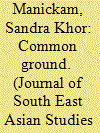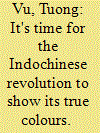|
|
|
Sort Order |
|
|
|
Items / Page
|
|
|
|
|
|
|
| Srl | Item |
| 1 |
ID:
090703


|
|
|
|
|
| Publication |
2009.
|
| Summary/Abstract |
The questions of how and when the Cold War manifested itself in Southeast Asia are here examined through the perceptions of Britain and Australia to regional and global events from 1945 to 1950. Both had major stakes in the eventual results of the local contentions in Southeast Asia, as well as in the global effects of great power rivalry. Yet even for these powers, determining when they believed the Cold War came to Southeast Asia is dependent on the definition adopted. By 1946, there was already recognition of entrenched ideological conflict in Southeast Asia, and that this threatened Western interests. In 1947, there was recognition of connections between the local communist parties and the 'global designs' of the Soviet Union. In 1948, there was the outbreak of armed violence in Burma, Malaya and Indonesia, though there was no evidence of direct Soviet involvement in these. Ultimately, however, it was the establishment of the PRC in 1949 (as a major regional communist power), in tandem with plans by non-communist states to coordinate policy against communism, which was seen as marking the arrival of fully-fledged Cold War in Southeast Asia.
|
|
|
|
|
|
|
|
|
|
|
|
|
|
|
|
| 2 |
ID:
090701


|
|
|
|
|
| Publication |
2009.
|
| Summary/Abstract |
Existing accounts of the Madiun incident or revolt of September 1948 suggest that it was a mainly domestic incident, with little direct link to international communism, whether through instructions or the international communist line. This paper argues that there were in fact strong links to both. The revolt was closely linked to the return of veteran communist Muso, who arrived from Europe after discussions with communists there, and with a mandate to help the PKI to reform its policies.
|
|
|
|
|
|
|
|
|
|
|
|
|
|
|
|
| 3 |
ID:
090705


|
|
|
|
|
| Publication |
2009.
|
| Summary/Abstract |
This article explores the common bases of knowledge on race among Malay intellectuals and British scholar-officials in British Malaya. It focuses on genealogies of knowledge that not only lead back to Europe, but to contexts in the Malay Archipelago, encompassing both coloniser and colonised as agents of production of colonial knowledge on race. Race was a strategy adopted by Malay intellectuals in a colonial milieu, in line with histories and conditions before and during the period of British control over Malaya. The notion of complicities is explored in studying the interaction between British and Malay intellectuals which produced colonial knowledge on race.
|
|
|
|
|
|
|
|
|
|
|
|
|
|
|
|
| 4 |
ID:
090699


|
|
|
|
|
| Publication |
2009.
|
| Summary/Abstract |
This article uses recently declassified archival documents from the Central Committee of the All-Union Communist Party (of Bolsheviks) concerning the Calcutta Youth Conference of February 1948. This evidence contradicts speculation that 'orders from Moscow' were passed to Southeast Asian communists at this time, helping to spark the rebellions in Indonesia, Malaya, Burma and the Philippines later that year. Secret working papers now available to researchers show no signs that the Soviet leadership planned to call upon Asian communists to rise up against their national bourgeois governments at this point in time. This article outlines the real story behind Soviet involvement in events leading up to the Calcutta Youth Conference, showing both a desire to increase information and links, and yet also a degree of caution over the prospects of local parties.
|
|
|
|
|
|
|
|
|
|
|
|
|
|
|
|
| 5 |
ID:
090702


|
|
|
|
|
| Publication |
2009.
|
| Summary/Abstract |
Cold War historians have neglected the significance of the year 1948 for Indochina. Based on new sources, this paper shows critical shifts in politics within the Vietnamese nationalist movement in 1948. These were the result of converging developments during late 1947 and early 1948, including changes in international politics, in French-Vietnamese relations, and in the relationship between non-communist and communist leaders within the Vi?t Minh state. By late 1948, Party ideologues were already looking beyond national independence towards building a new socialist regime. The nationalist coalition that had led the Democratic Republic of Vietnam (DRV) was seriously damaged in 1948, even though civil war would only break out several years later. As elsewhere in Southeast Asia, 1948 thus marked a new period: the beginning of the end of the 'united front' period and cooperation with bourgeois nationalists.
|
|
|
|
|
|
|
|
|
|
|
|
|
|
|
|
| 6 |
ID:
090706


|
|
|
|
|
| Publication |
2009.
|
| Summary/Abstract |
An important but little-studied act in the history of postwar Singapore was played out at the margins of the city. Here, the state was involved in a major campaign to socialise the 'squatters' of urban kampong into citizens of a high modernist state. The fire hazard in these settlements also contributed significantly to the process, as the residents were mobilised into fire-fighting squads and politicians acted on behalf of the victims of infernos by rehousing them in emergency public housing. This article proposes a new approach to postwar Singapore historiography at the interface between politics and social developments. It underlines the social agents, spatial dimension and historical continuity uncovered in the venture.
|
|
|
|
|
|
|
|
|
|
|
|
|
|
|
|
| 7 |
ID:
090700


|
|
|
|
|
| Publication |
2009.
|
| Summary/Abstract |
From the 1970s most scholars have rejected the Cold War orthodoxy that the Malayan Emergency (1948-60) was a result of instructions from Moscow, translated into action by the Malayan Communist Party (MCP). They have instead argued that local factors precipitated violence, and that the MCP was relatively unprepared when the Emergency was declared. This article puts the international element back into the picture. It shows that the change from a 'united front' to a 'two camp' international communist line from 1947 played a significant role in deciding local debates in favour of revolt. It also demonstrates how the MCP had plans for a graduated build-up to armed revolt before an Emergency was declared. This article therefore offers a model for a dynamic, two-way relationship between the international and local levels of Cold War.
|
|
|
|
|
|
|
|
|
|
|
|
|
|
|
|
| 8 |
ID:
090704


|
|
|
|
|
| Publication |
2009.
|
| Summary/Abstract |
Sayyidi 'strangers' and 'stranger-kings', borne on the eighteenth-century wave of Hadhrami migration to the Malay-Indonesian region, boosted indigenous traditions of charismatic leadership at a time of intense political challenge posed by Western expansion. The extemporary credentials and personal talents which made for s?da exceptionalism and lent continuity to Southeast Asian state-making traditions are discussed with particular reference to Perak, Siak and Pontianak. These case studies, representative of discrete s?da responses to specific circumstances, mark them out as lead actors in guiding the transition from 'the last stand of autonomies' to a new era of pragmatic collaboration with the West.
|
|
|
|
|
|
|
|
|
|
|
|
|
|
|
|
|
|
|
|
|